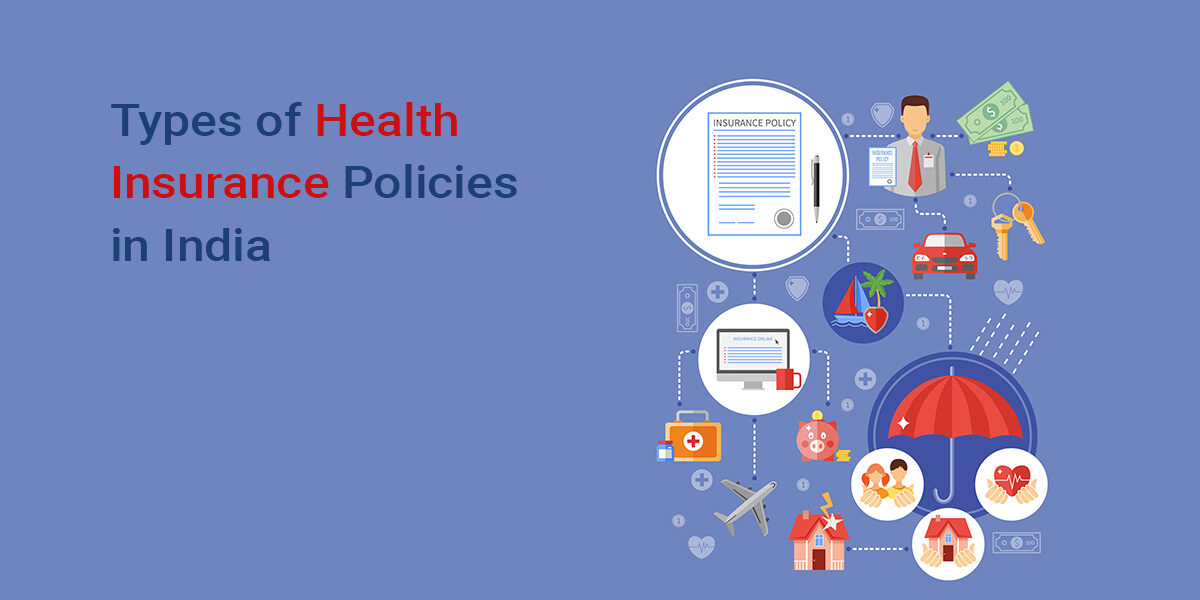Table of Contents
What Is Health Insurance?
A contract requiring an insurer to pay some or all of a person’s healthcare bills in exchange for a premium is known as health insurance. More precisely, health insurance often covers the insured’s medical, surgical, prescription medication, and dental expenditures.
Health insurance can pay the care provider directly or compensate the insured for expenditures incurred as a result of illness or accident. It’s frequently included in employee benefit packages as a way to entice top talent, with premiums partially funded by the business but frequently withheld from employee paychecks. With limited exclusions for S company workers, the cost of health insurance premiums is deductible to the payer, and the benefits received are tax-free.
Related Blog: Health Insurance: Types, Benefits, Eligibility – A Complete Guide For You
Types Of Health Insurance Policies In India
There are a total of 10 different types of health insurance plans available in India
1. Individual Health Insurance Plan
This insurance coverage is for a single person, as the name implies. This plan provides financial assistance in the event of a medical emergency. Individual policies must be purchased for each member of your family, and each insured member will have a separate sum guaranteed amount.
Example:
If a person is insured for an amount of Rs 3 lacs, then the person will be insured for Rs. 3 lacs. The policy will not cover anybody else in relation.
Features:
It protects a single person. To cover each family member, you’ll need to purchase individual plans (spouse, kids and parents).
Each covered member’s individual total guaranteed amount.
Hospitalization due to illness or injury, surgeries, lodging rent, childcare treatment, and other expenses are covered.
This plan is available to those between the ages of 18 to 65.
Benefits:
- Complete cover for the individual
- Full coverage of sum insured
- Can be topped up with more amount
- Covers most diseases
2. Family Floater Health Insurance Plan
The Family Floater Health Plan is a low-cost insurance option that covers all family members under one policy. That is to say, the sum insured floats for all members who are protected. This plan has a cheaper rate than individual health insurance policies that cover the entire family. Your spouse, children, and parents are all covered under the Family Floater Plan.
Example:
If a person buys a family floater insurance of Rs. 10 lacs. The policy covers his two daughters and wife. Now, according to the plan, the sum is provided as and when needed the policy is claimed. Suppose, the daughters claim the policy for 5 lacs, 2.5 each, then the father and mother are left with a cover of Rs 5 lacs.
Features:
- One cover for full family
- Coverage across ages
Benefits:
- No multiple premium
- Less documentation
- Family stays protected with one policy
3. Group Health Insurance Plan
It’s a form of a medical insurance plan for a group of people who work for the same company. This plan is typically chosen by an employer, corporate organisation, or startup to meet the health insurance needs of its employees. It is also one of the most important advantages that an organisation can provide to its employees.
Example:
An insurance provided by an employer could be termed under this form. The premium is split between employee and employer.
Features:
- The employee and his or her dependents are covered under the policy.
- An employee’s basic coverage is provided for free.
- Covers hospitalisation due to disease or injury, as well as severe illnesses.
- There is no waiting period for policy benefits.
Benefits:
- Maternity, OPD, and childcare treatment are all covered by some group insurance policies.
- Floater sum is guaranteed
- Is it possible to increase the amount insured? (if enabled by the employer).
4. Critical Illness Insurance Plan
If the insured is diagnosed with a catastrophic illness or disease, it gives cash advantages. Kidney failure, stroke, heart attack, paralysis, and other disorders are covered. Because the costs of treating these illnesses are so expensive, the Critical Illness Policy serves as a financial safety net if you are diagnosed with one of the diseases listed.
Example:
If a person is insured under the Critical Illness Insurance Plan, the person can take separate insurance against a particular disease or illness.
Features:
- It covers critical conditions like heart attacks, strokes, kidney failure, paralysis, and organ transplantation, among others.
- When you are diagnosed with a critical illness, you will get a one-time lump sum payment (up to the amount insured).
- To be eligible for policy benefits, the insured must live for at least 30 days.
Benefits:
Some plans also include free health screenings.
5. Personal Accident Insurance Plan
Accidents can happen at any time, and the medical bills associated with treating an injury can quickly deplete your resources. Medical expenses incurred as a result of an accident are covered by a Personal Accident Insurance Policy. The policy also covers the insured’s partial disability, permanent disability, and death as a result of an accident.
Example:
Insurance provided against accidents of a person is accident insurance.
Features:
- Accidental injuries, partial/permanent disability, and death are all covered under the insurance.
- It pays for the costs of hospitalisation in the event of an accident.
- In the event of the insured’s death, the nominee will receive a death benefit (up to the amount covered).
Benefits:
- It compensates for lost income if the insured becomes permanently disabled.
- In the event of the insured’s death, it pays for the dependent child’s school fees.
- In the event of hospitalisation due to an accident, the coverage gives a daily cash allowance.
- It pays for ambulance services.
6. Maternity Health Insurance Plan
A Maternity Health Insurance Cover can be added to a standard health insurance policy. It covers all costs incurred during pregnancy, delivery, and the postpartum period. The waiting period for this plan varies depending on the insurer. As a result, it’s best to have this strategy as soon as feasible.
Example:
A woman who already has health insurance, may choose to take additional maternity insurance after getting married.
Features:
- Pre- and post-hospitalization expenditures are covered under the coverage.
- It also pays for regular and caesarean births.
- It also covers pregnancies that are terminated owing to a life-threatening circumstance.
Benefits:
- The Baby’s first year of life is covered (first 90 days).
- It covers the expense of the newborn baby’s vaccinations.
7. Senior Citizen Health Insurance Plan
It is an insurance policy designed to fulfil the demands of older persons over the age of 60. The premium for this plan is greater since elderly persons require more medical treatment and are more likely to file a claim. Pre- and post-hospitalization, medical treatment, and other expenses are covered by the insurance policy. This plan also covers pre-existing ailments, albeit the extent of coverage is determined by the policy’s terms and conditions.
Example:
People in older age often experience unexpected illnesses and ailments. This form of coverage can protect people against such illnesses.
Features:
- Senior citizens over the age of 60 will find this to be ideal.
- Pre- and post-hospitalization as a result of an accident or sickness, medical care, domiciliary hospitalisation, and psychiatric therapy are all covered.
Benefits:
It’s possible that a health exam isn’t required to obtain the policy
8. Top Up Health Insurance
Any health insurance can be topped up at any time considering the insurers’ ability to pay premiums.
Example:
If a person is insured for Rs 5 lacs, then buying a top-up of Rs. 10 lacs can increase his insured amount to Rs. 15 lacs.
9. Hospital Daily Cash
A daily hospital cash plan gives a lump sum amount in the event of hospitalisation, which the insured can utilise as they see fit. He can utilise the money to cover such additional expenses or even to make up for lost income while he is in the hospital.
Example:
The insurer provides a sum amount to the individual, which they can use for whatever purpose they deem fit.
Benefits:
- The insurer decides to choose
- The insurer gets a blanket amount to settle bills
- The inflow of cash can help ease tension
10. Disease-Specific
A disease-specific medical insurance can help protect against specific diseases in case of a pandemic
Example:
During the year 2019-2020 many people bought insurance against covid-19 to help gain assistance in case of contracting the disease.
Benefits:
- Helps in cases when the disease is new and not covered under the policy
- Helps ease financial stress
- Helps save in case you contract the disease in the future
Summary
By now you know it is essential to buy a health insurance, but it is also important to choose the right kind of health insurance in order to protect you and your family. Our guide will help you gain a comprehensive understanding of which health insurance to buy.
Willing to Buy A Health Insurance Plan?
We hope our guide has helped you understand the importance of health insurance and you are looking forwards to insuring your future. LNG provides health insurance consultation and services that can help you choose the right health insurance for you and your family.




